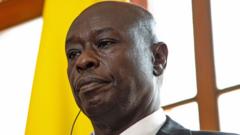Gachagua, known as Riggy G, was scheduled to defend himself against 11 charges but was unable to appear after being hospitalized with chest pain, prompting his lawyer to request a postponement. However, the Senate proceeded with the trial, highlighting the senators’ determination to remove him amidst ongoing tensions with President Ruto.
The trial culminated with a decisive vote, where a two-thirds majority of the 67 senators voted to unseat Gachagua on charges including corruption and inciting ethnic divisions. This impeachment follows months of power struggles within the government, particularly after Gachagua publicly criticized Ruto’s handling of mass protests against tax hikes.
The 59-year-old deputy president, who has described the proceedings as a “political lynching,” now faces medical treatment while discussing plans to challenge the impeachment. Speculation about potential successors has already emerged, mentioning several prominent figures from Kenya’s political landscape.
As the country navigates this political upheaval, Gachagua’s political future remains uncertain, and the impact of this impeachment may lead to significant changes in Kenya's governance structure.
This article provides a comprehensive overview of the recent political crisis in Kenya involving Deputy President Rigathi Gachagua, highlighting the events surrounding his impeachment and the implications for the nation's leadership.
The trial culminated with a decisive vote, where a two-thirds majority of the 67 senators voted to unseat Gachagua on charges including corruption and inciting ethnic divisions. This impeachment follows months of power struggles within the government, particularly after Gachagua publicly criticized Ruto’s handling of mass protests against tax hikes.
The 59-year-old deputy president, who has described the proceedings as a “political lynching,” now faces medical treatment while discussing plans to challenge the impeachment. Speculation about potential successors has already emerged, mentioning several prominent figures from Kenya’s political landscape.
As the country navigates this political upheaval, Gachagua’s political future remains uncertain, and the impact of this impeachment may lead to significant changes in Kenya's governance structure.
This article provides a comprehensive overview of the recent political crisis in Kenya involving Deputy President Rigathi Gachagua, highlighting the events surrounding his impeachment and the implications for the nation's leadership.

















